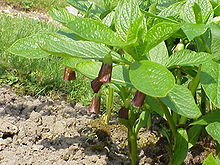Scopolia
| Scopolia | |
|---|---|
 |
|
| Scopolia carniolica | |
| Scientific classification | |
| Kingdom: | Plantae |
| (unranked): | Angiosperms |
| (unranked): | Eudicots |
| (unranked): | Asterids |
| Order: | Solanales |
| Family: | Solanaceae |
| Genus: |
Scopolia Lam. |
| Species | |
|
Scopolia carniolica |
|
Scopolia carniolica
Scopolia japonica
Scopolia lutescens
Scopolia parviflora
Scopolia tangutica
Scopolia is a genus of five species of flowering plants in the family Solanaceae, native to Europe and Asia. The genus is named after Giovanni Scopoli (1723–88), a Tyrolean naturalist.
Scopolia carniolica is a creeping perennial plant, with light green leaves and pale yellow to dull red flowers. It is sometimes cultivated as a decorative plant. Scopolia's extract (which contains a form of the alkaloid scopolamine) is used in at least one commercial stomach remedy (Inosea, produced by Sato Pharmaceutical). The extract is an anti-spasmodic in low doses and may be used to relax smooth muscle tissue or prevent motion-sickness induced nausea; in higher doses it is a poison having hallucinogenic and memory-inhibiting effects.
Other alkaloids found in Scopolia carniolica include cuscohygrine and hyoscyamine.
Alkaloids found in Scopolia tangutica include hyoscyamine, scopolamine, anisodamine, and anisodine.
Alkaloids found in Scopolia atropoides (possibly just a synonym for Scopolia carniolica) include atroscine.
The coumarin phenylpropanoids umbelliferone and scopoletin have been isolated from the roots of Scopolia japonica.
...
Wikipedia
